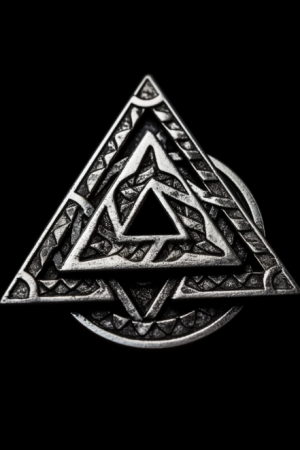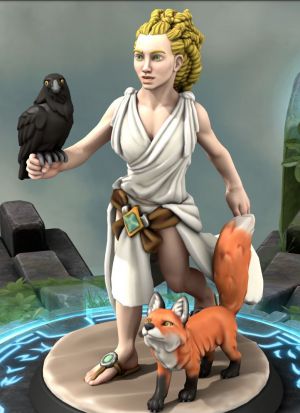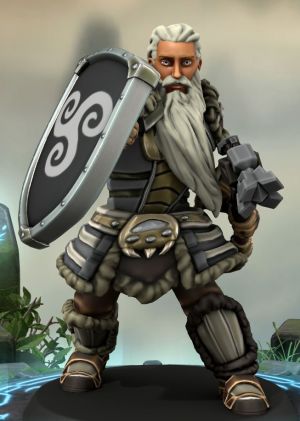Wodenism
| Type | Polytheistic |
|---|---|
| Races | Human, Elf |
| Organized | Yes |
| Founded | 1 IM |
| Books | Book of Woden |
| Deities | Woden, Thor, Frigg, Tiw |
Wodenism is the dominant religion in Otan, with its principal deity being known if not worshipped to some degree by most humans. Wodenism has also found its way into elven culture and figures prominently in their daily lives.
The Tenets of Wodenism[edit]
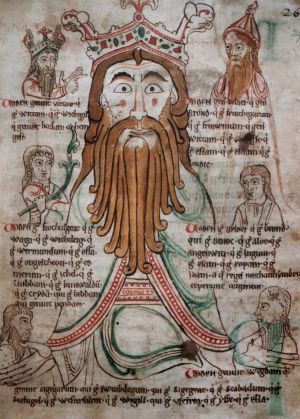
The four pillars of Wodenism are wisdom, strength, love and sacrifice, represented by Woden, Thor, Frigg, Tiw respectively. The Wodenist pantheon has a complete spectrum of gods, however these four remain the personifications of the core values of the faith.
The Book of Woden[edit]
Apparently written by Woden himself or someone purporting to be speaking in the voice of Woden, the book outlines the various tenets of Wodenism. It goes on to describe the various gods of the pantheon in stories and verse.
The Will to Power[edit]
In the Book of Woden, the three wills are described; the Will to Power, the Will to Perception and the Will to Transcendence. Woden points out that the Will to Power is the greatest of these and is the defining aspect of human(oid) existence. Woden's inclusiveness of other species has made Woden popular among other humanoids, particularly Ælfes.
Wodenist Cosmology[edit]
Creation[edit]
The primordial being Ymir became engrossed in a dispute with Woden in which the god slew him and fashioned Otan from his flesh. He went on to make the oceans from his blood, the mountains from his bones, trees from his hair, and so forth. Humans, Ælfes, Dweorgs, Grendel and the other races were given life from a combination of Ymir's flesh and blood (or earth and sea).
It is perhaps not a coincidence that the primordial being Ymir is sometimes conflated with the primordial substance Ylem and many believe that they are one in the same. This conflation adds to the possibility of the creation story being an actual historical account rather than a fantastical metaphor; in the spirit of most religious folk tales. As more in the Wodenist clergy become familiar with Ylem, this supposition has gained strength with the church.
Heaven[edit]
Those who fall bravely in battle are hand picked by Woden's Vakyries to live out their afterlives in the halls of Asgard in Valhalla. This mythical place is said to be an endless festival, where revelers human and god alike drink, feast, fight and engage in sex on a continuous cycle for eternity. Revelers are said to be in a state of constant joy.
Afterlife[edit]
For the not so brave, or those who led boring and safe lives, the spirits of the dead are sent to Helheim the dominion of Hel. Helheim is little different than Otan for most who populate it. One can raise a pig on a farm, for example, perform their daily chores, eat the same food and conduct a boring afterlife, without interruption, much the same as their boring lives.
Ragnarok[edit]
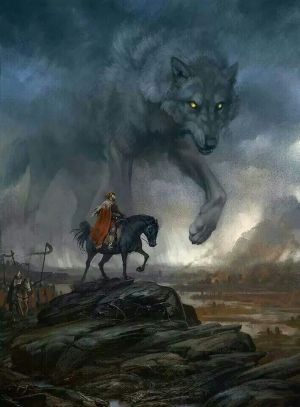
In Wodenist lore, Ragnarok is a series of events, including a great battle, foretold to lead to the death of a number of great figures, including the gods Woden, Thor, Tiw, and Loki. The destruction will include natural disasters and the submersion of Otan in water.
After these events, Otan will resurface anew and fertile, the surviving and returning gods will meet and the world will be repopulated by two human survivors. Ragnarok is an important event in Wodenist lore and has been the subject of scholarly discourse and theory in the history of Otan.
In different cultures, the story of Ragnarok can vary. The Aydahar version, for example, will tell of how Jormungandr binds Otan together after a great war nearly splits the planet in two. In the Garis version, Fenris returns to Otan to rule over the remaining survivors, which the Garis assume to be mostly Garis.
The Wodenist Pantheon[edit]
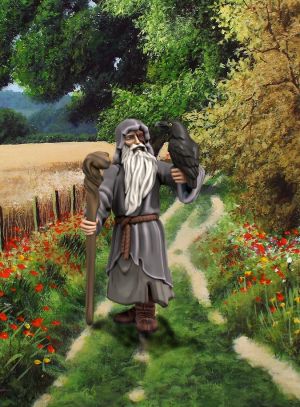
As in most religions, the Wodenist religion overflows with examples of all four elements of the divine: the creator, the messenger, the intercessor and the destroyer. Apart from the rarity of having a very relatable creator, who also fulfills a role as intercessor, the religion is overflowing with messengers and destroyers; enough destroyers to keep the gods very busy.
The Creator[edit]
As creators go, Woden is an unusual one. He created Otan by killing and hollowing out the body of a giant. After this amazing feat he spent the remainder of his days seeking wisdom, fathering humans and routinely interacting with them on a very personal level. Particularly in the northern Soltustik tribes, it is not unusual for individuals to claim their lineage from Woden himself. Of his many names, the All-Father is perhaps the one most suited to him.
The role of the creator is filled solely by:
- Woden: God of Wisdom, the All-Father
The Intercessors[edit]
The gods of the Wodenist religion have interactions with humans regularly... if the humans themselves are exceptional. The gods will sit at table and eat and drink with humans who excel in some aspect of physical prowess or cognitive genius. They will intercede while engaged in this intimate dialogue to protect their human guests from, for example, a mischievous giant. It would be very rare, however, for them to take direct action in a human affair, such as intervening in a battle. In the latter case the gods will rather send a messenger, a Valkyrie, to tell the slain human how he did.
The role of the intercessor is fulfilled by the following gods and goddesses:
- Baeldaeg: God of Bravery and Light
- Bragi: God of Poetry, Song and Chance
- Eostre: Goddess of Fertility
- Frigg: Goddess of Love, the Hearth and Home
- Sindri: The Dweorgen God of the Forge
- Thor: God of Strength, Thunder and Lightning
- Tiw: God of Sacrifice and War
The Messengers[edit]
The Destroyer[edit]
All things must end, and for Wodenists this time is Ragnarok. Otan will one day be consumed in flames and the malevolent creatures who bring about this destruction are none other than the offspring of Loki.
The role of the destroyer is fulfilled by:
- Surtr: An ancient giant with a flaming sword.
His allies will include:
- Fenris: A Very Large Wolf
- Hel: Goddess of the Underworld and all the dead
- Jormungandr: The World Snake or Ouroboros
- Loki: The God of Mischief
The Wodenist Clergy[edit]
There are two principal types of Wodenist clergy. The itinerant and the stationary. The stationary tend to practice their faith and devotions at the a chapter of the Temple of Woden. The itinerant tend to serve in the military or with bands of adventurers seeking fame and fortune while spreading the will of Woden to the world.
Temple of Woden[edit]
The Temple of Woden is a loosely organized bureaucracy that is dedicated to building edifices throughout Otan to support the worship of Woden and other gods in the Wodenist pantheon. A temple can be found in nearly every major city in northern Otan.
Temple Activities[edit]
Since the beginning of time, Wodenist priests have strived to create the fabled Nine Herbs Charm. This charm is said to bring additional power and veneration upon the creator and invoker of the charm.
The Temple has also been actively involved in expansionist measures, encouraging its clerics to spread the word of Woden to other nations and peoples.
Sanctum of Fenris[edit]
The Sanctum of Fenris is Garis' version of Wodenism with Fenris the wolf being the main object of worship. Subjects, are entirely of the three Garis variants. Followers of this faith believe that it was Fenris who lost a paw to the treachery of Tiw (and not the other way around), in his dispute with the god. Fenris is prophesied to get his revenge during Ragnarok.
Chantry of Jormungandr[edit]
The Chantry of Jormungandr is the main religious offering in the Altinqor. The Aydahar, having dragon's blood coursing through them are less likely to attend temple services than most people of Otan, but they give deference to Jormungandr in their daily lives through customs and superstitions. Jormungandr is prophesied to have a deadly battle with Thor during Ragnarok, though few Aydahar believe that Ragnarok is a true prophesy.
Fists of Woden[edit]
The Fists of Woden are a small and relatively new faction based largely in Ortalyk though with a few adherents in Sigis from where they derive their signature martial arts style. The members of the Fists of Woden are nearly all monks. They are a fearless band who believe that the Temple of Woden has lost its way, being too permissive in allowing non-humans and other undesirables to worship.
Religious Observances[edit]
- 30th of Jeltoskan - the Night of the Wild Hunt, where Woden and his fellow gods set out to hunt for the feasts of
- 1st to 6th of Holy Week - Yule, which continues all the days throughout Holy Week.
Popular Folklore[edit]
Player Notes[edit]
| Copyright © 2021-2025 by Robyn Blaber and Will to Power Games. All rights reserved. Content on this website may not be reproduced without written permission of the copyright owner. |
